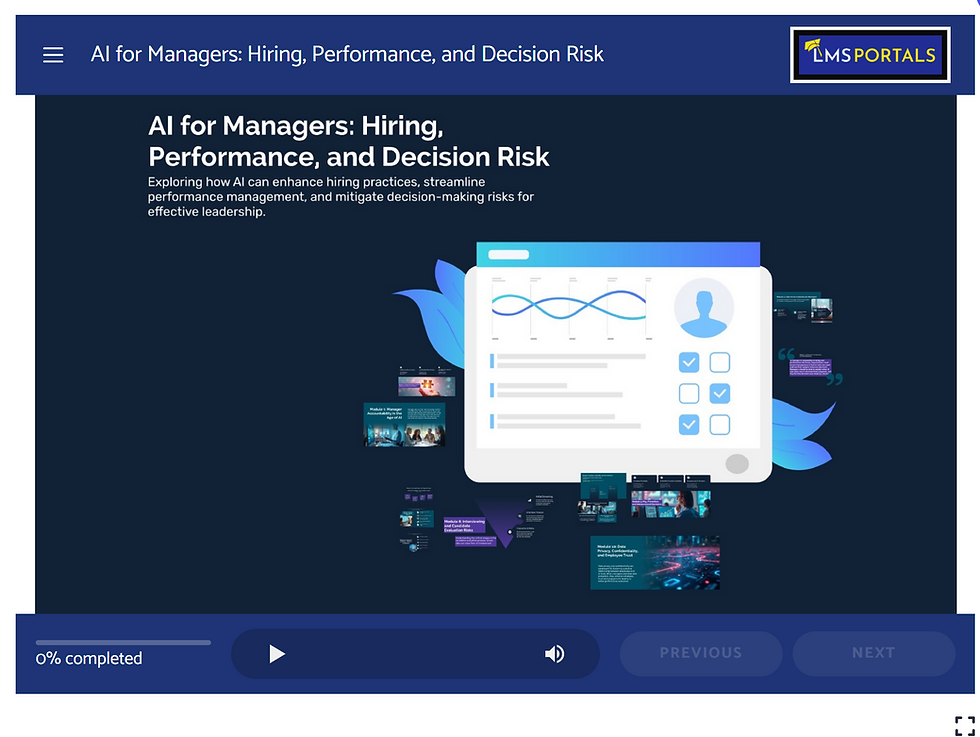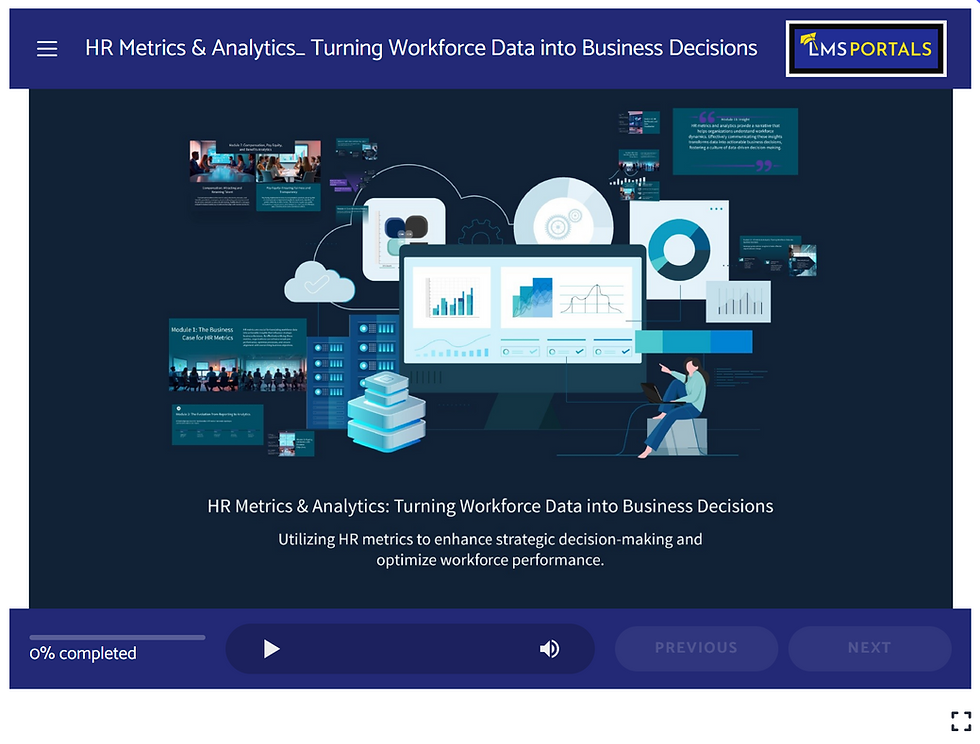How HR Service Providers Enhance Employee Training and Development
- LMSPortals

- Sep 11, 2024
- 8 min read

An HR service provider is an external company or organization that offers a wide range of human resources services to businesses, helping them manage essential HR functions more efficiently. These providers take on responsibilities such as payroll processing, employee benefits administration, recruitment, training and development, compliance management, and performance tracking.
By outsourcing these functions to an HR service provider, companies can focus on their core business activities while ensuring that their workforce is well-managed and compliant with regulations. HR service providers cater to businesses of all sizes, offering customized solutions that address specific organizational needs.
HR service providers, with their specialized expertise and resources, can significantly enhance employee training and development, delivering strategic benefits to organizations. Here's how they do it.
1. Tailored Training Programs
HR service providers have the expertise to develop customized training programs that address the specific needs of a business. By conducting thorough needs assessments, they identify skill gaps and design programs that focus on enhancing the competencies employees need most. Whether it’s soft skills like communication and teamwork or technical skills such as software proficiency, these tailored programs ensure training is relevant and impactful.
2. Access to Advanced Learning Technologies
In today’s digital age, eLearning and virtual training platforms are essential for efficient and flexible employee development. Many HR service providers offer access to state-of-the-art Learning Management Systems (LMS), interactive courses, and mobile learning platforms that enable employees to learn at their own pace. These technologies support on-demand learning, making it easier for employees to access training anytime, anywhere.
3. Facilitating Continuous Learning
Learning doesn’t stop after a one-time training session. HR service providers promote a culture of continuous learning by offering ongoing development programs. Through follow-up sessions, refresher courses, and regular assessments, they ensure that employees continue to build on their skills and stay up to date with industry trends. This long-term approach leads to more engaged employees who are constantly evolving in their roles.
4. Expert Facilitation and Coaching
One of the standout advantages of partnering with an HR service provider is gaining access to professional trainers and coaches. These experts deliver training sessions that are not only informative but also engaging and interactive. Through workshops, seminars, and one-on-one coaching, they help employees grasp complex concepts, develop problem-solving skills, and implement what they’ve learned in real-world scenarios.
5. Performance Tracking and Analytics
Tracking the progress of employee training can be daunting for internal HR teams. HR service providers use advanced analytics and reporting tools to monitor training effectiveness. By evaluating employee performance before, during, and after training sessions, they can determine which programs are delivering the best results and identify areas for improvement. This data-driven approach ensures that training investments lead to tangible improvements in employee performance.
6. Compliance and Regulatory Training
Compliance training is a critical area where HR service providers add tremendous value. From industry regulations to company policies, employees need to be consistently educated on compliance requirements to avoid costly mistakes or legal issues. HR service providers ensure that organizations remain compliant by delivering up-to-date training on relevant regulations, providing certifications, and offering refresher courses when needed.
7. Reducing the Burden on Internal HR Teams
Designing, managing, and tracking training programs can be overwhelming for internal HR departments, especially in small and medium-sized enterprises. Outsourcing employee development to HR service providers not only ensures high-quality training but also frees up internal teams to focus on other critical HR functions like recruitment, retention, and employee engagement.
8. Scalability and Flexibility
HR service providers offer scalable training solutions that can adapt to the size and growth of an organization. Whether you have a small team or a global workforce, these providers can tailor training programs to meet the demands of the business. Additionally, they offer flexible solutions like remote training options and modular course structures that allow organizations to adjust as their needs evolve.
9. Fostering Leadership Development
Beyond general employee training, HR service providers also focus on leadership development programs. These programs are essential for nurturing future leaders within an organization. By offering specialized courses in areas such as decision-making, team management, and strategic planning, they help employees transition into leadership roles with the confidence and skills needed to succeed.
10. Improving Employee Engagement and Retention
Employee training and development are key drivers of employee engagement. Employees who feel that their company is investing in their growth are more likely to be engaged and stay with the company for the long term. HR service providers play a critical role in enhancing employee satisfaction by providing high-quality training programs that foster a culture of growth and development.
In Summary
Partnering with HR service providers is a strategic move for organizations looking to enhance their employee training and development efforts. From creating tailored programs to leveraging advanced technologies and offering expert facilitation, these providers bring valuable resources to help businesses cultivate a skilled, engaged, and high-performing workforce. By entrusting employee development to HR service providers, organizations can focus on their core competencies while ensuring their teams are continually growing and excelling in their roles.
How to Choose the Right HR Service Provider for Your Company
Selecting the right HR service provider is a strategic decision that can significantly impact the efficiency, productivity, and culture of your organization. With numerous options available, it’s essential to choose a provider that aligns with your business’s unique needs and goals. Here’s a guide to help you make the right choice.
1. Understand Your HR Needs
Before you start evaluating potential providers, it’s crucial to identify your specific HR challenges and needs. Are you looking for help with payroll management, compliance, employee training, recruitment, or all of the above? Understanding your pain points will help you focus on providers that specialize in the areas most relevant to your business.
Ask yourself:
What are our current HR gaps?
Do we need a comprehensive solution or targeted services?
How do we plan to scale our HR functions as we grow?
2. Assess Provider Expertise and Specialization
Not all HR service providers offer the same range of services or expertise. Some specialize in particular industries, while others may focus on specific functions like payroll, benefits administration, or employee training. It’s important to choose a provider that has the expertise you need in your specific industry or area of HR.
Key considerations:
Does the provider have experience in your industry?
Can they handle the complexities of your workforce size and structure?
Do they have a strong track record in delivering the services you need?
3. Evaluate Technology and Tools
Technology is at the core of modern HR management. From cloud-based Human Resource Management Systems (HRMS) to Learning Management Systems (LMS), the tools your provider uses should simplify processes and improve efficiency. Look for a provider that offers user-friendly, scalable technology solutions that integrate seamlessly with your existing systems.
Check for:
Ease of use for both HR teams and employees
Mobile access and remote work support
Data security and compliance features
Integration with existing platforms like payroll and performance management software
4. Customization and Flexibility
Every company is different, and a one-size-fits-all approach might not work for your unique requirements. The right HR service provider should offer flexible solutions tailored to your business. Whether you need to customize benefits packages or develop specific employee training programs, ensure the provider can adjust to your specific needs.
Ask:
Can they customize their services to fit our requirements?
How flexible are their packages as our business evolves?
5. Check for Compliance Expertise
Keeping up with employment laws, tax regulations, and compliance standards can be a daunting task, especially if you’re operating in multiple states or countries. The right HR service provider should have a deep understanding of compliance requirements and offer guidance on how to navigate them.
Ensure they provide:
Expertise in federal, state, and local labor laws
Support for regulatory compliance such as GDPR, OSHA, or ACA
Risk management services and audit support
6. Look at Their Training and Development Capabilities
Employee development is key to retaining talent and staying competitive. Many HR service providers offer training and development solutions, but it’s important to evaluate whether these programs align with your company’s goals. Look for providers who offer a range of learning options, from eLearning platforms to leadership development programs.
Consider:
Does the provider offer learning solutions that cater to different employee levels (entry-level, management, leadership)?
Can they provide industry-specific training or certifications?
Do they support career development and upskilling?
7. Analyze Pricing Structure
Cost is always a consideration, but it’s important to evaluate the value you're getting for your investment. Some providers offer fixed-fee packages, while others charge based on the services you use. Be clear on the provider’s pricing structure and ensure there are no hidden costs. Also, assess whether their pricing aligns with your budget and the expected ROI.
Ask about:
Pricing transparency and any additional fees
Service-level agreements and what’s included in each package
ROI projections based on the services provided
8. Check for Customer Support and Service Levels
HR issues can arise unexpectedly, so it’s essential that your provider offers reliable customer support. Look for providers with responsive, knowledgeable support teams that can assist you promptly when challenges arise. Pay attention to the service-level agreements (SLAs) and response times they promise.
Key considerations:
What’s their average response time for queries or issues?
Do they provide 24/7 support?
What channels of support are available (phone, email, chat)?
9. Review Client References and Testimonials
A provider's track record with other clients is one of the best indicators of the quality of service you can expect. Ask for references or check online reviews and testimonials to get a sense of how satisfied their clients are with their services.
Questions to ask references:
How has the provider improved your HR processes?
How responsive are they to issues or requests?
What challenges have you faced, and how were they resolved?
10. Evaluate Cultural Fit
Finally, your HR service provider should align with your company culture. A good cultural fit ensures smoother collaboration and communication. Take the time to understand the provider’s approach to client relationships, communication style, and their overall values. This will ensure a long-lasting partnership that helps your company grow.
Ask:
Does the provider’s working style align with ours?
How do they handle communication and feedback?
Do they prioritize collaboration and transparency?
Choosing the right HR service provider requires careful evaluation of your company's specific needs, the provider’s expertise, technology, and flexibility, as well as their pricing structure and customer support. By taking the time to assess each of these factors, you can find an HR partner who not only meets your current needs but also supports your future growth. A strong HR service provider will help streamline your HR processes, foster employee development, and ultimately contribute to the overall success of your business.
About LMS Portals
At LMS Portals, we provide our clients and partners with a SaaS-based, multi-tenant learning management system that allows you to launch a dedicated training environment (a portal) for each of your unique audiences.
The system includes built-in, SCORM-compliant rapid course development software that provides a drag and drop engine to enable most anyone to build engaging courses quickly and easily.
We also offer a complete library of ready-made courses, covering most every aspect of corporate training and employee development.
If you choose to, you can create Learning Paths to deliver courses in a logical progression and add structure to your training program. The system also supports Virtual Instructor-Led Training (VILT) and provides tools for social learning.
Together, these features make the LMS Portals platform the ideal SaaS-based platform to support our HR Service provider partners.
Contact us today to get started or visit our Partner Program pages



Comments